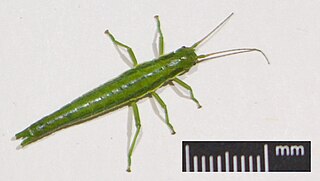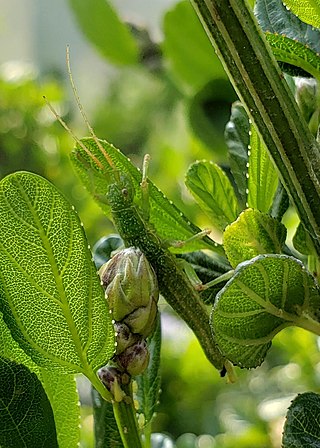
Convolvulaceae, commonly called the bindweeds or morning glories, is a family of about 60 genera and more than 1,650 species. These species are primarily herbaceous vines, but also include trees, shrubs and herbs. The tubers of several species are edible, the best known of which is the sweet potato.

The Phasmatodea are an order of insects whose members are variously known as stick insects, stick-bugs, walking sticks, stick animals, or bug sticks. They are also occasionally referred to as Devil's darning needles, although this name is shared by both dragonflies and crane flies. They can be generally referred to as phasmatodeans, phasmids, or ghost insects, with phasmids in the family Phylliidae called leaf insects, leaf-bugs, walking leaves, or bug leaves. The group's name is derived from the Ancient Greek φάσμα phasma, meaning an apparition or phantom, referring to their resemblance to vegetation while in fact being animals. Their natural camouflage makes them difficult for predators to detect; still, many species have one of several secondary lines of defense in the form of startle displays, spines or toxic secretions. Stick insects from the genera Phryganistria, Ctenomorpha, and Phobaeticus include the world's longest insects.

Nyctaginaceae, the four o'clock family, is a family of around 33 genera and 290 species of flowering plants, widely distributed in tropical and subtropical regions, with a few representatives in temperate regions. The family has a unique fruit type, called an "anthocarp", and many genera have extremely large pollen grains.

The Virgin Mountains are a mountain range of the northeastern Mojave Desert, located in Clark County, southeastern Nevada and Mohave County, northwestern Arizona.

Timema is a genus of relatively short-bodied, stout and wingless stick insects native to the far western United States, and the sole extant member of the family Timematidae. The genus was first described in 1895 by Samuel Hubbard Scudder, based on observations of the species Timema californicum.

Timema douglasi is a stick insect native to northern California and southern Oregon. It was first identified in 1996 as a specialist feeder on old-growth Douglas fir. It is one of five parthenogenetic species of Timema.

Timema poppense, the "Pope Valley timema", is a species of walkingstick in the family Timematidae. It is found in California, and originally described from a nature reserve in the Pope Valley.

Timema bartmani, or Bartman's timema, is a species of stick insect in the family Timematidae. It is found in North America.
Timema ritense, the Santa Rita timema, is a species of walkingstick in the family Timematidae. It is found in North America. The species was originally spelled "ritensis", but this spelling did not match the gender of the genus Timema, and therefore has undergone a mandatory change following ICZN Article 31.2.
Timema nevadense, the Nevada timema, is a species of walkingstick in the family Timematidae. It is found in North America.

Timema californicum, the California timema, is a species of walkingstick in the family Timematidae. It is found in North America.

Timema cristinae, or Cristina's Timema, is a species of walking stick in the family Timematidae. This species is named in recognition of the person who first found and collected it, Cristina Sandoval. It is found in North America, in a small region of southern California, US. T. cristinae is one of the smallest species of stick insects. They are flightless, and feed on the shrubs on which they live.

Timema boharti, or Bohart's timema, is a species of walkingstick in the family Timematidae. It is found in North America.
Timema podura, the Sierra Nevada timema, is a species of walkingstick in the family Timematidae. It is found in North America.

Timema chumash, the chumash timema, is a species of walkingstick in the family Timematidae. It is found in North America.
Animal Ethics is a nonprofit organization formed to promote discussion and debate around issues in animal ethics and to provide information and resources for animal advocates. They also do outreach work in several countries on the issue of speciesism. Their aim is to create a world where moral consideration is extended to all sentient beings. The organization's website covers topics such as speciesism, sentience, veganism and wild animal suffering and has content translated into several languages.

Timema knulli, Knull's Timema, is a stick insect native to California.

Timema shepardi, Shepard's Timema, is a stick insect native to northern California. It was first identified in 1999. It is one of five parthenogenetic species of Timema.
Tanja Schwander is a Swiss evolutionary biologist and professor at the University of Lausanne. She is known for her work on the Evolution of sexual reproduction.

Timema monikense is a parthenogenetic stick insect native to California.















